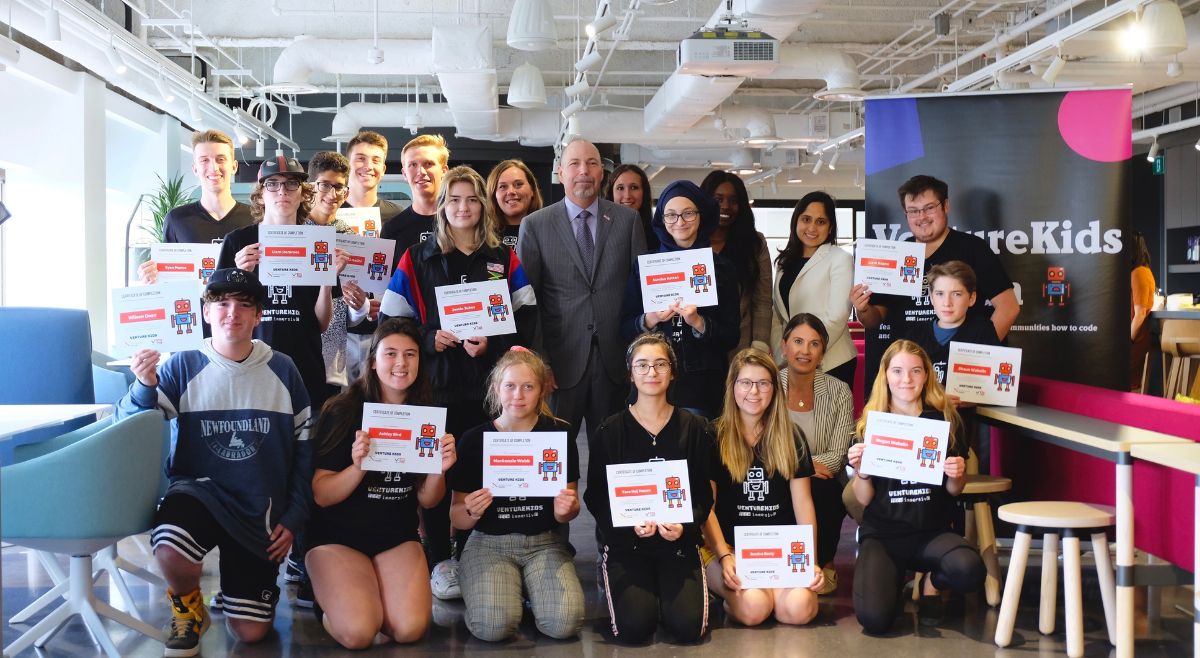Unique Toronto Campus Initiative Gives Youth the Code to the Future

Photo above features graduates of 2019 TECHImmersive program.
Twenty-seven young people went back to school in September with new, future-ready skills. Through a unique partnership between Northeastern University’s Toronto campus and local non-profit organization VentureKids Canada, the group gained artificial intelligence fundamentals, critical coding know-how, and entrepreneurship skills.
“Talent is everywhere. Opportunity is not,” says Aliza Lakhani, Dean and CEO of the Toronto Campus. “It’s critical that we start early and show young people — especially those in underrepresented communities — the power of what is possible for them. Giving them access to technology, industry, and education results in the skills and confidence they need to take the next step. Today’s students are tomorrow’s leaders, and we need each one of them at the table to solve the world’s biggest issues.”
Making Critical Tech Skills Accessible
After a conversation with VentureKids founder, Takara Small, Aliza quickly recognized that the non-profit and Northeastern University shared a passion for widening youth access to innovation and the post-secondary experiences. VentureKids focuses on accelerating access to in-demand technical skills that will give young people living in underserved neighbourhoods the ability to compete in tomorrow’s economy.
The first iteration of the Northeastern Toronto and VentureKids immersive tech program was born in 2019. Called TECHimmersive, the free offering gave 18 students from rural Ontario the opportunity to learn coding, business skills, and artificial intelligence basics from industry professionals in the heart of downtown Toronto.
During this year’s program, SummerTech, students spent four weeks immersed in learning, from lectures to experiential activities. They also got to pitch a startup idea that uses tech to solve a community problem to a group of industry professionals. The competition came with a chance to win seed funding for their idea.
Northeastern University Toronto hosted sessions on artificial intelligence (AI), supplied food baskets for learners, and provided program graduates with a digital badge highlighting the technical and soft skills that students acquired through their participation in the course. Also known as micro-credentials, digital badges are increasingly recognized by employers, and can help to open doors to future educational and employment opportunities. Takara explains:
“Tech is one of very few spaces in which young people of colour can find careers in lieu of a degree. And while I’m excited that some of these kids may go into tech, they are all gaining critical life skills. They’ll be able to use what they learn in whatever career path they choose.”
Learning from Leading Experts
Those who do choose tech as a career path will be entering an in-demand area with a quickly growing need for IT-savvy professionals. According to an Information and Communications Technology Council report, Canada will need to fill 250,000 tech jobs over the next three years alone. Some SummerTech participants, like 14-year-old Mariam Sarikaya, used the SummerTech opportunity to broaden her knowledge of career options in the industry.
“The classes gave me new possibilities that I didn’t know existed,” Mariam says of the experience. “I had been interested in software development but now I also find emerging technology [like AI] interesting. I loved the sense of community, the educators because they taught us things we don’t learn in school, and I loved getting feedback on my ideas.”
One of those educators was Winston Li. The founder of Arima, an AI-driven insights search engine that helps users discover predictive and actionable analytics about their customers, Winston is also on the Program Advisory Committee of Northeastern’s Master of Professional Studies in Analytics. He says the inclusion of AI sessions was particularly relevant as this branch of computer science is rapidly becoming embedded in every part of our society.
“It’s important for young people to understand the technology as some of them are evaluating AI as a possible career path,” says Winston. “Even if they don’t end up studying computer science, AI will be a hot topic of discussion for decades to come. Therefore, it’s good to give them an overview of the subject from a professional standpoint so that they understand the technology and what it will do for their society. Students asked a lot of interesting questions, and they showed clear interest in the subject.”
Building on the Power of Diversity
While SummerTech is a prime example of Northeastern Toronto’s commitment to connecting with local communities to make an impact, it also aligns with Northeastern’s new Academic Plan. The first global pillar of this plan focuses on building on the power of diversity.
Aliza says the collaboration has allowed the campus to accelerate its impact and broaden its reach to help to elevate all members of society. “At Northeastern University, one of the questions I think about often is, what can we be doing to ensure all Canadians have access to the tools and skills they need to build for the future?” she says. “And to that point, what role can Northeastern University play to break down the barriers and reduce the friction? This partnership is a great example of that coming to life. We need to harness the full talent pool — regardless of where you live or what your background is.”
After the success and impact of SummerTech, Aliza says she hopes to broaden and build on Northeastern University Toronto’s partnership with VentureKids. Takara says the families that VentureKids serves value genuine efforts to build lasting connections. “I can’t overstate how important it is that an institution like Northeastern University cares about the widening gap enough to want to contribute to bridging it.”




